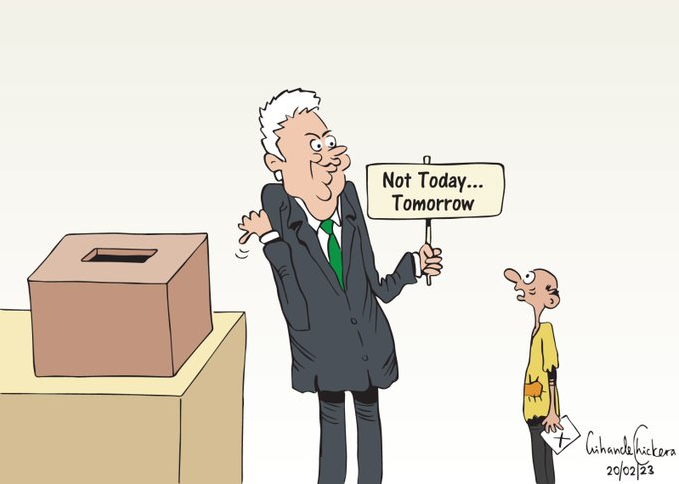Sri Lanka’s democracy is on a knife edge. When Gotabaya Rajapaksa fled his post, Ranil Wickremesinghe became acting president. And then he got officially elected to the post of President with the support of the Rajapaksas in parliament. Whatever our political views about Wickremesinghe, he did follow the proper parliamentary procedure to be legally constituted as president.
The delay in local government polls risks inciting the very instability the Wickremesinghe presidency was supposed to end, weakening our democratic institutions and putting the economy at risk.
Some were even willing to go one step further. And say Ranil Wickremesinghe would adhere to democratic institutions and stabilise the economy. With the threat of parliament being attacked the very same day that Rajapaksa fled from office, some continuity in the political institutions and even personalities was not unwelcome to many Lankans. But Wickremesinghe’s efforts to meddle with the local government elections, risks putting paid to the very reason that may have made him a good choice for the presidency in turbulent times – belief in his adherence to Sri Lanka’s democratic institutions and his ability to manage the economy.
Not holding elections because we have no money can very well lead to a slippery slope. Let us say we are still bankrupt in December 2024. Would the President then say that since we do not have funds, we cannot hold a Presidential election?
The delay in local government polls risks inciting the very instability the Wickremesinghe presidency was supposed to end, weakening our democratic institutions and putting the economy at risk. There are no moral or legal reasons for delaying the elections. However, we do hear pecuniary and political ones. The government claims they do not have funds to hold elections. But it managed to find money to hold an Independence Day tamasha that nobody wanted. While the price of the Independence parade is less than what the local government elections will cost, it is still a sign that money can be found when the government gives it priority.
Not holding elections because we have no money can very well lead to a slippery slope. Let us say we are still bankrupt in December 2024. Would the President then say that since we do not have funds, we cannot hold a Presidential election? Or worse, does this lead to perverse incentives: those in power would have an incentive to keep Sri Lanka bankrupt so that they can continue to delay presidential and parliamentary elections, if they risk losing!
Granted that local government elections are not parliamentary or presidential elections. And it is quite possible that the government is sincere in its belief that this is a minor postponement. And once the IMF provides credit and the economy turns around, the elections can be held. Unfortunately for the government, this is not how the opposition political parties see it. Indeed, most Lankans are sceptical about the government’s rationale for the delay in local elections. They believe the government is delaying elections on spurious grounds because of the delay in getting approval for the IMF package.
President Ranil Wickremesinghe is risking both the political and economic stability of the country by delaying these elections. Except for some determined protesters who have continued unabated, the protests have died down over the past few months. The reasons are many – from fatigue and the daily struggles that people are going through, to the sense that this government must be given the time to sort things out. A delay in elections risks re-igniting the protesters who will join with the opposition political parties to oppose the government. Depending on how effective these protests are, the government will be faced with two options. Permit the protests to grow and risk being thrown out of office, or crackdown and risk bloodshed, and still be thrown out of office.
Even if a crackdown leads to the protesters giving up, the climate it creates will be far from conducive to economic reform, foreign investment and a regeneration of the economy. This, in turn, can undermine the Wickremesinghe government’s efforts to rebuild the economy. While the IMF only looks at economic indices in making decisions about lending, the governments on the IMF’s board may not do so. They will have to explain to their citizens why they are throwing good money after bad, by approving loans for a government that is cracking down on its own people and enabling the very politicians responsible for the collapse of the economy to continue to run the country.
Ranil Wickremesinghe should hold the local government elections, safe in the knowledge that his party and that of his current coalition allies – the Rajapaksas – will lose. Rather than rue this loss, he should welcome and trumpet it as a reflection of Sri Lanka’s political durability and continuity. If the opposition does very well – as it is likely to – he should dissolve parliament and call for early elections. Again, safe in the knowledge that these elections will lead to the defeat of the Rajapaksas.
President Wickremesinghe can then claim credit for ushering in an orderly democratic transition and economic stability, rather than a disorderly one that undermines the economy. He will of course have to govern together with a messy political alliance that is likely to consist of some combination of the Samagi Jana Balawegaya, the JVP, and Tamil and Muslim parties, with all the challenges such a setup entails. But these challenges will at least have the excuse of being in the service of a decent democracy and a better economy
by Ram Manikkalingam,
Director, Dialogue Advisory Group
Courtesy The Island/20.02.23
